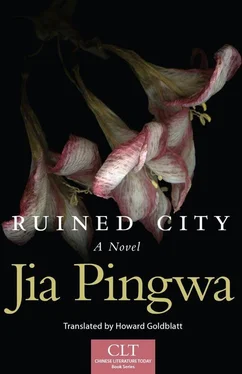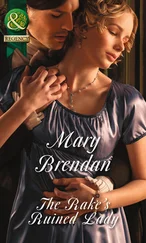“Where did you get such weird ideas, Jingwu?” Zhuang said. “You’re still single because you’re surrounded by reproductive organs, is that it?”
With a laugh, Jingwu invited Zhuang to sit in the little room, where three rows of pots stood on the desk by the window. In them were dahlias the size of rice bowls and green cacti the size of fingernails. Flowerpots took up even the head and foot of the bed and the floor in front of the four walls. A jade-colored porcelain vase with a dark narcissus rested atop a finely made square table in the middle of the room. Zhao had stored his furniture at his mother’s place when his old residence was torn down, all but this small table and the vase, a Ming object.
“Flowers fill the room, and yet the most conspicuous spot is reserved for a plant with no reproductive organs,” Zhuang said.
“Flowers are the plants’ reproductive organs, and to me they’re different types of women. The narcissus is not blooming now, and its flower isn’t flashy even when it is. So you’re going to make fun of me for favoring this one. In our Eastern tradition, narcissus is often the symbol for a pure, noble, chaste woman. But in the West, in Greek mythology, Narcissus was a beautiful young man, one who, with little sexual desire and emotion, loved no girls. One day, when he went to a spring to drink water, he saw his reflection and fell hopelessly in love with the image. He fell in and drowned when he leaned forward to embrace his reflection; his soul separated from his body, and he turned into a narcissus.”
Zhuang had not heard that the narcissus was transformed from a man.
“So you consider yourself a narcissist?”
“Yes, I do. I know I’m not as handsome as the Pan An portrayed in ancient texts, but I think I cut quite a figure among Xijing’s literary types. When I look at these plants, I think about all the girls in the world, but this narcissus is my favorite. I feel deeply for the separation of its body and soul.”
“I see,” Zhuang said. “Jingwu, are you planning on getting married?”
“The narcissus is content to live with some fresh water and a few rocks. I do want to get married, but which flower-like woman will be mine? Zhuang Laoshi, you’re a sensitive man. You know what I’m thinking. So I’ll be frank with you. Could you give Liu Yue to me?”
Zhuang managed to hide his shock at Zhao’s confession. He had sensed that Zhao had feelings for Liu, but had not expected him to think about marrying her.
“I can’t give her to you,” Zhuang said with a soft laugh. “She works for my family, but she’s an independent person. I can’t decide who she marries.”
Zhao grabbed his hands.
“I just want you to be the matchmaker. She doesn’t have a city residency or a career, but I don’t care about that. I really like her. She’s pretty, she’s clever, and she’s been living under the influence of your family. I’d be totally devoted to her and would never mistreat her. I know I haven’t accomplished much and have no standing in cultural circles, but I will make her happy if she marries me.”
“I’ll be your matchmaker, but don’t be in a hurry. Wait till I sound her out. I don’t think it will be a big problem. Since coming to work at my house, she has read a lot and has met many people. She’s looking more and more like a young lady from a fine family. So, Jingwu, you recommended her to come to work for us because you wanted me to educate her for you!”
An elated Zhao brought out a bottle and toasted Zhuang. “That’s why I call you Laoshi, Teacher.”
They talked about the gallery until Zhuang saw that it was getting late and pressed Zhao to go see Bai Yuzhu. Niu Yueqing and Liu Yue were in when he got home. They had both showered.
“Why did the afternoon argument end so early?”
“Mr. Zhong, the editor, fell ill an hour after we started, so the judge adjourned for the day, saying they had the basic picture and will now move to the discovery and investigation phase. If needed, there will be a second round of arguments, so we should be prepared to answer a summons to appear.”
“Mr. Zhong is ill? What happened? How could he choose now, of all times, and at court? Others will think he got sick because he was losing the argument.”
“The judge wouldn’t make that kind of assumption. Mr. Zhong was standing there making his argument. He had written out thirteen pages and was reading it carefully, logically, and coherently. In the meantime, Jing Xueyin was sitting there, her face bathed in sweat, while the judge kept nodding his head. Then I heard a thud and looked up. Mr. Zhong was nowhere in sight. He had collapsed. People were in shock and rushed up to help him. His face was ashen, his eyes were shut. He was unconscious, so the judge had him sent to the hospital and adjourned the court. He was awake when we reached the hospital. Doctors had no idea of the cause and were conducting tests.”
Zhuang had assumed it was something common, like a headache or a stomachache, and was now thrown into a minor panic by the news of Zhong’s possibly serious illness.
“It looks like he’ll be all right,” Niu Yueqing said. “Zhou Min said Mr. Zhong was in a bad mood when he arrived at court this morning. He’d had a fight with the leadership at the Department of Culture, apparently over his job title. Zhou said he tried to make the old man feel better on the way over, but Mr. Zhong kept sighing, saying that nothing was going his way. He didn’t get the job title he wanted, and someone had suffered a broken leg. I asked Zhou Min what the broken leg was all about, and he said he had no idea.”
Zhuang knew, and he was about to explain it to Niu Yueqing, but he changed his mind. Instead, he voiced his anger at the Provincial Office about job titles and the leadership.
“You’d better stay put,” his wife said. “I was angry when you didn’t show up this morning, but now that Mr. Zhong is ill, it was probably a good thing for you not to be there. Seeing Jing face to face might have excited you. I was frightened by the sight of Mr. Zhong falling ill, and all I want now is for everyone on our side to stay calm. Anger is bad for your health. If more people get sick, that would please the Jing woman no end, and other people would cover their mouths and laugh out their rear ends.”
Zhao Jingwu came in while they were having dinner, a huge stuffed puppy in his hands. When Liu Yue opened the door, he put the stuffed animal up to her neck, so elating her that she rolled around on the sofa, hugging and kissing the toy.
“That’s quite a present for Liu Yue,” Zhuang said. “It must have set you back sixty or seventy yuan.”
Zhao was embarrassed. “I liked it so much I just had to buy it.”
“Not so fast. You can’t be happy unless I get something, too,” Zhuang said.
“Let’s see if this makes you happy. Judge Sima said that after hearing today’s arguments, he thinks Jing Xueyin’s claim is on shaky ground. He said there’s just one sticking point. We argued that the image of the woman in the article was a composite, a generalization, and the epitome of many women’s experience, while they countered that this was just sophistry, since that is not how documentary works are written. They’re not knowledgeable enough to know whether or not documentary works can be as we said, so they will have to consult specialists and literary scholars.”
“That worries me,” Zhuang said. “Strictly speaking, documentary articles can’t be written in a fictional format, where characteristics are collective and generalized.”
“So what do we do?” Zhao asked. “Does that mean we’ll lose the case, like dropping a piece of meat just as it’s getting to your mouth?”
Zhuang said nothing for a long time. Niu Yueqing summoned Zhao to the kitchen with her eyes.
Читать дальше


![Matthew Vincent - [you] Ruined It for Everyone!](/books/216429/matthew-vincent-you-ruined-it-for-everyone-thumb.webp)









